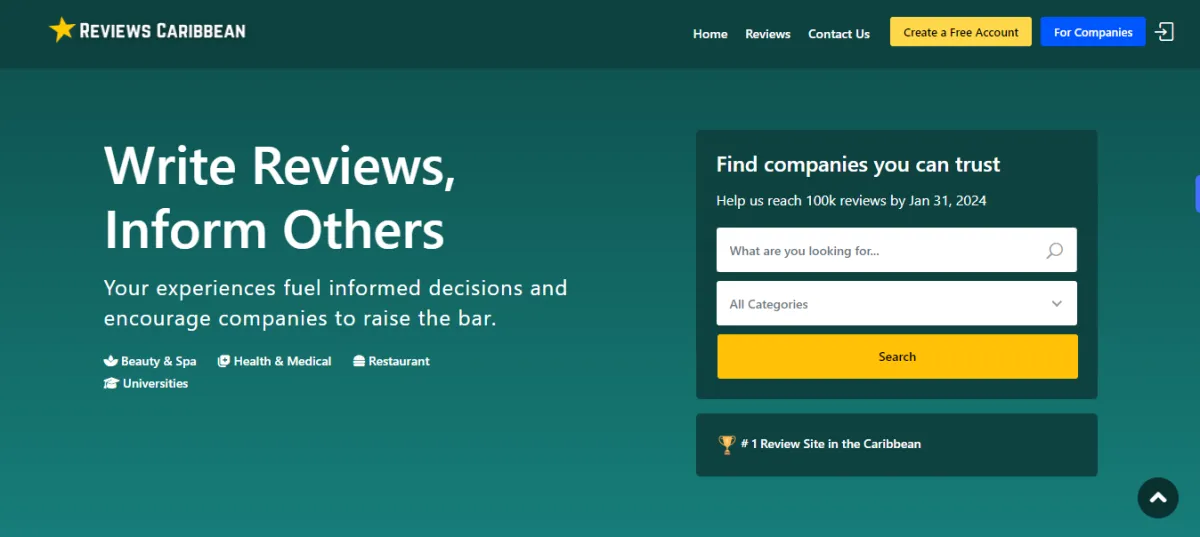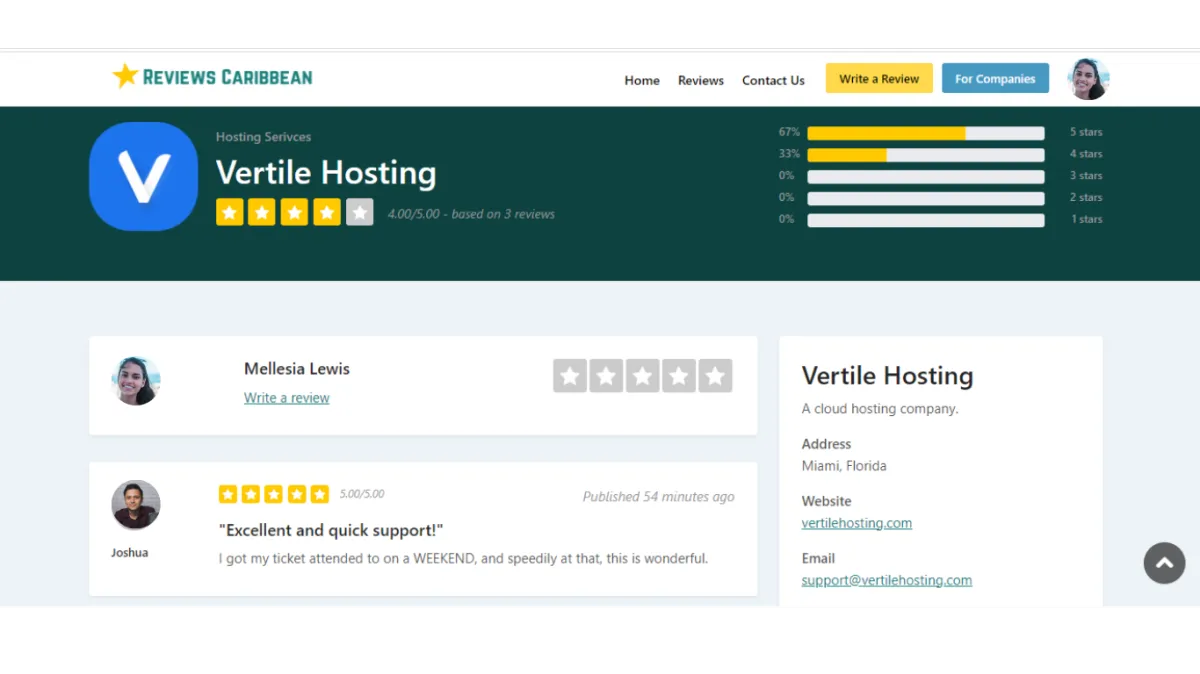Stay Informed. Shop Smart. Share Your Voice.
Enhance Your Consumer Experience
This consumer site was created to help you find useful information about your rights as a consumer and shop with confidence in the Caribbean.

Committed to Helping Consumers Shop Smart
Dive into our resources here to find solutions to your consumer issues

Know Your Rights
Explore the intricate landscape of consumer rights and protections in this comprehensive guide. From understanding the evolution of consumer protection laws to navigating product recalls.

Returns and Refunds
Discover how to make returns and refunds work for you! Our guide unravels the intricacies, offering tips and insights into the future of consumer-friendly policies.

How to Raise Your Voice and Seek Redress
Unlock the potential of your voice! Explore the dynamic world of consumer advocacy with our guide.
How Reviews Caribbean Works: A User's Guide to Getting the Most Out of the Platform
Walk users through the features of Reviews Caribbean, demonstrating how to navigate, contribute, and benefit from the platform.



Navigating the Reviews Landscape
Provide insights into different platforms for reviews and guide consumers on choosing reliable sources for accurate information.
Explore Where to Find Reliable Information
Insights into diciphering authentic from fake reviews
Elevating your shopping experience through trust

Contribute to Reviews Caribbean by Writing a Review
Let's make a difference, one review at a time.

Impact customer experience standards
Your review, along with Derick's, Kim's, and Raul's, empowers others to make informed choices and motivates businesses to elevate their standards.

Let's all shop with more confidence!
By contributing, you're not just building Reviews Caribbean; you're shaping a community where every purchase is backed by shared experiences.
Committed To Reaching 100k Reviews by August 2024
With your help we can reach these metrics so that we have a safer and more transparent shopping experience in the Caribbean.
100%
Claimed Businesses
We are working to ensure that 100% of the business listings are claimed by legitimate business owners who believe in this platform.
50k
Reviewers Like You
It's our aim to provide consumers with a secure space to review businesses so everyone can freely share their purchase experiences.
100,000+
Reviews
Let's build a community where we all can easily read reviews on Caribbean businesses prior to making purchase decisions.
Read Our Latest Blogs

The Art of Price Comparison: Finding the Best Value
The Art of Price Comparison: Finding the Best Value
Imagine saving hundreds, if not thousands, of dollars simply by mastering the art of price comparison. In today's fast-paced market, where every dollar counts, understanding how to compare prices and value is your secret weapon. Comparing prices and value isn't just about finding the lowest price—it's about discovering the true worth of what you buy. Whether you're eyeing a new gadget or contemplating a service, understanding the intricacies of value based pricing and evaluating higher price points can significantly impact your overall satisfaction and wallet.
In this blog, we'll dive into three essential strategies to master price comparison: Calculating the Total Cost of Ownership, Negotiating for Lower Prices and Discounts, and Identifying Hidden Costs and Fees. By the end, you'll be equipped with the knowledge to make smarter, more cost-effective decisions, ensuring you always get the best bang for your buck. Let's embark on this journey to savvy shopping together!
Calculating the Total Cost of Ownership
Defining Total Cost of Ownership (TCO)
When you buy something, the initial price is just the tip of the iceberg. The Total Cost of Ownership (TCO) encompasses all the expenses you'll incur over the product's lifetime. This includes not only the purchase price but also the costs of maintenance, operation, and eventual disposal or resale. Understanding TCO is crucial for comparing prices and value accurately.
Components of TCO
Initial Purchase Price: The amount you pay upfront.
Maintenance and Operational Costs: Regular expenses to keep the product in good condition.
Depreciation and Resale Value: The decrease in value over time and the potential amount you can recover when you sell it.
For instance, consider buying a car. The sticker price is just the beginning. You'll also need to budget for insurance, fuel, regular servicing, and potential repairs. Over time, the car's value will depreciate, but understanding TCO helps you choose a vehicle that offers the best long-term value.
Calculating TCO for Different Products
To calculate TCO, follow these steps:
List all potential costs: This includes purchase price, maintenance, and operational costs.
Estimate the lifespan: Determine how long you expect to use the product.
Calculate annual costs: Divide the total costs by the product's lifespan.
Add it all up: Sum the purchase price and the total annual costs over the product's lifespan.
For example, when comparing two laptops—one priced at $1,000 with minimal maintenance costs and another at $800 with higher maintenance costs—you might find that the higher-priced laptop actually has a lower TCO over five years due to fewer repairs and better performance.
By taking TCO into account, you can make more informed decisions, ensuring that you're truly getting the best value for your money.
Negotiating for Lower Prices and Discounts
The Art of Negotiation
Negotiation isn't just for business deals—it's a powerful tool that can help you save money on everyday purchases. Whether you're buying a car, booking a vacation, or signing up for a service, effective negotiation can lead to lower prices and valuable discounts. Imagine paying less than the listed price simply by asking the right questions and presenting a compelling case.
Strategies for Effective Negotiation:
Do Your Homework: Research the product or service, its market value, and competitors' prices.
Be Polite and Confident: Approach the negotiation with a positive attitude and confidence.
Know Your Limits: Have a clear idea of the maximum amount you're willing to pay.
Leverage Information: Use your research to highlight why a lower price is justified.
Be Ready to Walk Away: Sometimes, the willingness to leave the deal can persuade the seller to offer a better price.
Understanding the Seller’s Perspective
To negotiate effectively, it helps to understand what motivates the seller. Sellers are influenced by various factors, including market conditions, competition, and demand. Recognizing these can give you an edge in negotiations.
Factors That Affect Pricing Decisions:
Market Share: Sellers aiming to increase their market share may offer discounts to attract more customers.
Competition: High competition often leads to better deals as sellers strive to outdo each other.
Demand: During low-demand periods, sellers might be more willing to negotiate to make a sale.
For example, if you're aware that a new model is about to be released, you can use this information to negotiate a better deal on the current model.
Tips for Negotiating Better Deals
Research and Preparation: Before entering a negotiation, gather as much information as possible. This includes the product's market value, the seller's typical pricing, and any current promotions.
Timing Your Purchase: Timing can be crucial. End-of-season sales, clearance events, and the end of the fiscal year are often good times to find deals.
Building a Relationship with the Seller: Establishing rapport can make the seller more willing to offer discounts. Be friendly and respectful; this can go a long way.
Example: You might notice that a store offers significant discounts during holiday sales. By timing your purchase and negotiating, you could secure an even better deal.
By mastering the art of negotiation, you can achieve significant savings, ensuring that you always get the best possible price.
Identifying Hidden Costs and Fees
Common Hidden Costs
Hidden costs can turn what seems like a great deal into a costly mistake. These are expenses that aren't immediately obvious but can significantly impact the total amount you end up spending. Identifying these costs is crucial for comparing prices and value accurately.
Examples of Hidden Costs:
Shipping and Handling Fees: Online purchases often have additional shipping costs.
Installation Fees: Products that require professional installation can come with extra charges.
Maintenance Fees: Ongoing costs to keep a product or service in good condition.
Service Charges: Fees for using a service, like booking fees for tickets or convenience fees for payments.
How to Spot Hidden Fees
To avoid surprises, it's important to be diligent when reviewing purchase agreements and contracts. Here are some tips to help you identify hidden fees:
Read the Fine Print: Always read the terms and conditions thoroughly. Look for any additional fees that might be listed in small print.
Ask Questions: If something isn't clear, ask the seller or service provider to explain any potential extra costs.
Check Reviews: Look for reviews and testimonials from other customers. They often mention unexpected fees they encountered.
Red Flags to Watch For:
Vague or unclear pricing information.
Terms like "additional charges may apply."
Lack of transparency about costs.
For instance, when signing up for a new internet service, you might find that the advertised price doesn't include modem rental fees or setup charges. By asking the right questions upfront, you can avoid these hidden costs.
Mitigating Hidden Costs
Once you've identified potential hidden costs, the next step is to minimize them:
Negotiate Fees: Ask if certain fees can be waived or reduced. Sellers are often willing to negotiate to close the deal.
Look for All-Inclusive Options: Sometimes, paying a bit more upfront for an all-inclusive package can save money in the long run.
Use Consumer Protections: Be aware of your rights as a consumer. Many countries have regulations that protect against unfair hidden fees.
Example: When renting a car, you might encounter hidden fees for insurance, additional drivers, and fuel. By opting for an all-inclusive rental package or using your own insurance, you can reduce these extra costs.
Conclusion
Mastering the art of price comparison is an essential skill in today's market. By understanding and applying the principles of Calculating the Total Cost of Ownership, Negotiating for Lower Prices and Discounts, and Identifying Hidden Costs and Fees, you can make smarter, more informed purchasing decisions.
Remember, comparing prices and value goes beyond just finding the lowest price—it's about uncovering the true value of your purchase. By considering factors like value based pricing and evaluating higher price points, you ensure that every dollar you spend brings you the maximum benefit.
Next time you face a purchasing decision, apply these strategies to get the best deal and make the most of your money. Happy shopping!
Call to Action
Ready to help others make informed decisions and find the best value? Join Reviews Caribbean today and share your experiences with local businesses. By writing reviews, you contribute to a smarter, more informed consumer market. Sign up now and become a part of a community dedicated to finding and sharing the best deals!
Committed to Helping Our Clients Succeed
Lorem ipsum dolor sit amet, consectetur adipiscing elit. In convallis turpis efficitur enim efficitur pulvinar. Nunc erat nibh, tempor quis volutpat eu, consectetur at ante. Curabitur venenatis orci sed auctor sollicitudin. Curabitur feugiat justo mauris, eget finibus tortor congue non. Donec feugiat mattis nisl et semper. Nulla rutrum est ac iaculis bibendum.

Kim Wexler

Lorem ipsum dolor sit amet, consectetur adipiscing elit. Quisque nisi nunc, tincidunt non nibh non, ullamcorper facilisis lectus. Sed accumsan metus viverra turpis faucibus, id elementum tellus.

Billy Jackson

Lorem ipsum dolor sit amet, consectetur adipiscing elit. Quisque nisi nunc, tincidunt non nibh non, ullamcorper facilisis lectus. Sed accumsan metus viverra turpis faucibus, id elementum tellus.
Become a reviewer, Today!

© 2024 Reviews Caribbean - All Rights Reserved
info@reviewscaribbean.com
+1 507-384-9680 (US)

Facebook
Instagram
LinkedIn